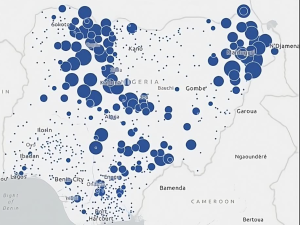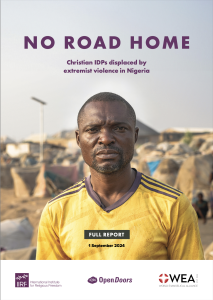 Two major new reports have shed light on the scale of the persecution of Christians in Nigeria.
Two major new reports have shed light on the scale of the persecution of Christians in Nigeria.
In August, the Observatory of Religious Freedom in Africa (ORFA) published a 136-page report covering the four-year period from October 2019 to October 2023, detailing killings and abductions of Christians in terms of geographical location and aggressor. The data shows that more Nigerian Christians were victims of violence than Nigerians of other religions. During the period, 16,769 Christians were killed.
The report states that “Nigeria continues to face a multifaceted security crisis marked by widespread violence, particularly against religious communities… The most striking point is that the Fulani militia are killing Nigerian civilians unopposed. Mass killings, abductions and the torture of whole families go largely unchallenged as government forces pursue targets hundreds of miles away, according to the research findings.
“Most civilians were killed or abducted during attacks on their communities… They often involved a whole spectrum of violence, suffering and destruction, leading to high numbers of forcibly displaced people. Their fields were destroyed or taken over by the aggressors (‘land grabbing’).”
Killings of Christians was reported in all 36 states of Nigeria with the largest numbers in the North West and North Central regions. Over 3,500 Christians were killed in Kaduna state in the North West region, while 2,600 were killed in Benue state, 1,500 in Plateau state and 1,400 in Niger state (all in the North Central region).
The report states that Fulani herdsmen were responsible for over 9,000 of the killings, Boko Haram just under 1,000 and Islamic State West Africa Province (an off shoot of Boko Haram) just under 300. Other terrorist groups were responsible for just under 5,000 killings.
Misleading “farmer-herder conflicts” description
The report states that violent community attacks in the North Central zone are often tagged “farmer-herder conflicts” and attributed to climate change. However, the study states: “This is often not the case… insisting on one generic narrative, engaging in denial and insisting on political correctness is not only overly simplistic in many cases but also misleading and unhelpful. For example, when villagers report that they have been attacked by armed Fulani herdsmen or Fulani militia, it is important to report this fact instead of using the word ‘Bandits’ or ‘Unknown Gunmen’.”
A source quoted in the report states, “The Nigerian media and the immediate past government deliberately chose to call the Fulani terrorists operating in the Northwest ‘bandits’ to conceal the real intention of their nefarious activities in the region, thereby making it look like it is just criminality and not terrorism as it is. That is why when you look critically at all media reportage on the happenings in the Northwest, you will always hear the term ‘bandits’ but when you look at the Middle Belt, all you will see are mostly herdsmen. This is why I strongly believe that both the armed Fulani herdsmen and the bandits are ‘identical twins’ working to execute the same agenda in both the Northwest and the Middle Belt… both to be considered branches of Fulani militia.”
The report states that “Many factors play a role [in the attacks] but violent Islamism, as a religious ideology, is an important part of it” and details the vision of Usman Dan Fodio, a Fulani radical Islamic scholar who established the Sokoto Caliphate in 1808 and vowed to “enforce Islam through the power of the sword from the Sahara Desert in the north to the Atlantic Ocean in the south.” However, the report clearly states that ORFA is not taking sides as to the motivation of attackers but rather “wants to let the data speak for itself without purposefully steering towards one or other of these narratives”.
Read the full Observatory of Religious Freedom in Africa report
No Road Home
 The second report, “NO ROAD HOME: Christian IDPs displaced by extremist violence in Nigeria,” was published in September by Open Doors International in association with the International Institute for Religious Freedom and the World Evangelical Alliance.
The second report, “NO ROAD HOME: Christian IDPs displaced by extremist violence in Nigeria,” was published in September by Open Doors International in association with the International Institute for Religious Freedom and the World Evangelical Alliance.
The focus of the report is on the mass displacement of Christian communities and it states: “In the northern state of Borno where Islamic militants thrive and target Christians, and in Plateau state [in the Middle Belt region], where Fulani militant violence results in uprooted Christian communities, the problem is unrelenting.
“This research in Borno and Plateau states indicates mass displacement driven by deliberate attacks on Christian communities, and State failure to protect them. Christian IDPs [Internally Displaced Persons] have reported faith-based discrimination and neglect in displacement settings, and an increased threat level for Christians who try to return home.”
Pastor Barnabas’ story
The experience of Pastor Barnabas (pictured on cover of report) who was attacked in 2019 by Fulani militants, is described in the report: “I was on the farm with my brother, Everen, and his wife, Friday. We were walking when we heard rapid shooting of guns and other sounds… We didn’t know that the militants had surrounded us. [They] came with guns, machetes, [and] sticks.”
Everen and Friday were not able to escape their attackers and almost five years later Pastor Barnabas is still impacted by the trauma of the attack. “I kept running […and] one of [the militants] followed me” he says in the report. “He hit me on my hand with a stick and my hand was badly broken.” Years later, his hand remains damaged and he cannot afford the medical fees for the necessary operation. “Now, I have lost everything that I had. Everything in my home and village was burnt; I was left with nothing.”
Pastor Barnabas has been living in an informal IDP camp for five years, made up of makeshift tents. His tent is too small to house all of his family and informal camps have limited access to essential support. Most of the Christians in the camp fled because of violence that has targeted their communities. He says: “We are displaced because of violence. The news doesn’t care about it, politicians don’t talk about it, we are remaining in darkness… being forgotten, being disregarded.”
Today, Pastor Barnabas is a minister for thousands of Christian IDPs in the camp. He speaks of the appalling living conditions and the risk of violence. “We don’t have good hygiene, water, toilets [or] sanitation. Many people are dying… People only live here because it’s worse outside the camps – because of the horrendous persecution that has displaced them.”
The report concludes that “the scale of suffering caused by forced displacement and violence in Nigeria is vast and concerning… despair was a common sentiment expressed by Christian IDPs and it is clear that more needs to be done, by both state and non-state actors, to address the material, emotional, spiritual and psychosocial needs of displaced persons in Nigeria.”
Read the full Open Doors International report
(Observatory of Religious Freedom in Africa, Open Doors International)
Map: Observatory of Religious Freedom in Africa
Image: Open Doors International
